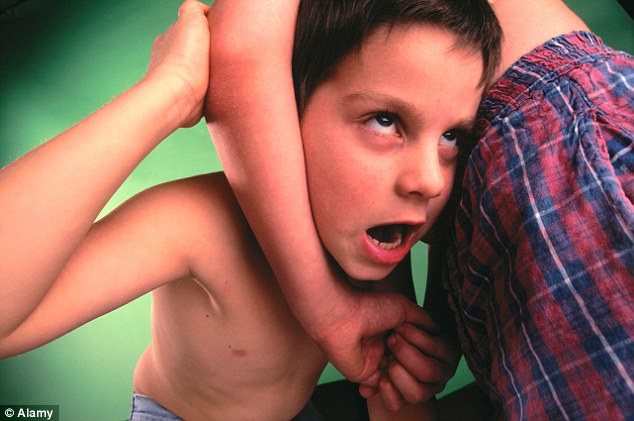- New experiments indicate altruism has environmental triggers
- Suggest altruistic behaviour governed more by relationships than instincts
Mark Prigg for MailOnline
49
View
comments
Are children born nice?
It is one of the most debated concepts in psychology, whether altriusm is a result of nature or nurture.
Now, a pair of Stanford psychologists has conducted a new series of experiments that show altruism has environmental triggers, and is not something we are simply born with.

Researchers studied 1-2 year olds, and say the results suggest that altruistic behaviour may be governed more by relationships, even brief ones, than instincts.
HOW THEY DID IT
Researchers enlisted 34 one- and two-year-olds and split them into two groups.
In the first group, the experimenter would roll a ball back and forth with the child and chat.
After a few minutes, the experimenter would 'accidentally' knock an object off the table, and observe whether the child would help pick it up, exactly as in the 2006 study.
The difference was in the second group.
Here, the experimenter and the child would each play with their own ball, known as 'parallel play,' while the experimenter engaged in the same kind of chitchat.
Again, after a few minutes, the experimenter would knock an object off the table.
The children who engaged in reciprocal play were three times more likely to help pick up the items as the children who had engaged in only parallel play.
In 2006, a study involving toddlers found that the 18-month-olds were willing to provide a helping hand to the experimenters without being prompted.
This expression of altruistic behaviour in such young children aligned with what many scientists believed to be an expression of innate altruism, and the findings have served as the basis for dozens of studies since.
However, Rodolfo Cortes Barragan, a psychology graduate student at Stanford, and Carol Dweck, the Lewis and Virginia Eaton Professor of Psychology, suspected there might be more to the story.
The researchers behind the 2006 study engaged in a few minutes of play with the children, in order to make them comfortable with new people in a new setting, they found.
But this interaction, however brief, might have primed the toddler subjects toward altruistic behaviour and affected the outcome of the experiment, they believe.
'Kids are always on the lookout for social cues, and this is a very prominent one,' said Barragan, the lead author on the research paper.
'Does the person's play indicate that they'll care for me? These actions communicate a mutuality, and the child responds in kind.'
Barragan and Dweck designed a new experiment to isolate the effect of the pretest warm-up period.
They enlisted 34 one- and two-year-olds and split them into two groups.
In the first group, the experimenter would roll a ball back and forth with the child and chat.
-
 Are electric shocks the key to curing paralysis?...
Are electric shocks the key to curing paralysis?...
 Inside the Mercedes self-guiding car that's built for...
Inside the Mercedes self-guiding car that's built for...
 Eight planets found that could support life - and two are...
Eight planets found that could support life - and two are...
 The bed that lets parents monitor their little darlings 24...
The bed that lets parents monitor their little darlings 24...
After a few minutes, the experimenter would 'accidentally' knock an object off the table, and observe whether the child would help pick it up, exactly as in the 2006 study.
The difference was in the second group.
Here, the experimenter and the child would each play with their own ball, known as 'parallel play,' while the experimenter engaged in the same kind of chitchat.
Again, after a few minutes, the experimenter would knock an object off the table.
The children who engaged in reciprocal play were three times more likely to help pick up the items as the children who had engaged in only parallel play.

The results suggest that altruistic behaviour may be governed more by relationships, even brief ones, than instincts.
When the scientists repeated the experiment under slightly different conditions with older children, the reciprocal-play group was two times more likely to lend a hand.
The results suggest that altruistic behaviour may be governed more by relationships, even brief ones, than instincts.
'I think the findings will stir up some controversy, but in a good way,' Dweck said.
'People often call something 'innate' because they don't understand the kinds of subtle experiences that can make something, like altruism, flourish. Rodolfo has discovered a really subtle experience that has a powerful influence.'
One of the arguments for innate altruism was that it was an evolutionarily beneficial adaptation – instinctively caring for others would result in reciprocal care, improving one's own chances of survival.
And there might still be evolutionary pressures toward altruism, Dweck said.
'I think, as humans, our claim to fame is our flexibility – our ability to adapt to new situations.'
The researchers said that more studies are needed to verify the findings, particularly in children younger than 18 months.
'Following the reciprocal play, children felt a sense of trust in the other person,' Barragan said.
'If children trust the people in their world, they may have an easier time learning the culture of that world – effectively making it easier for them to achieve new levels of personal and interpersonal success.'
Share or comment on this article
-
 Heart-stopping moment man is hit in the head by knife on...
Heart-stopping moment man is hit in the head by knife on...
-
 Cat thoroughly unimpressed as Bulldog puppy drags her bed
Cat thoroughly unimpressed as Bulldog puppy drags her bed
-
 Moment off-duty cop accidentally shoots himself in front of...
Moment off-duty cop accidentally shoots himself in front of...
-
 Unbelievable moment car drives WRONG WAY round roundabout
Unbelievable moment car drives WRONG WAY round roundabout
-
 This is what happens when you challenge a Disney villain
This is what happens when you challenge a Disney villain
-
 Steve Jobs' yacht Venus unveiled for first time in 2012
Steve Jobs' yacht Venus unveiled for first time in 2012
-
 Kiss Cam captures couple's hilarious cell phone fight
Kiss Cam captures couple's hilarious cell phone fight
-
 From the air: New footage highlights plight of the loneliest...
From the air: New footage highlights plight of the loneliest...
-
 Hilarious reaction as officer walkes into live television...
Hilarious reaction as officer walkes into live television...
-
 Horrific moment bull is stabbed and beaten to death in...
Horrific moment bull is stabbed and beaten to death in...
-
 Kai the abandoned dog settles in at rehoming centre
Kai the abandoned dog settles in at rehoming centre
-
 Trailer for Jeremy Kyle's new ITV show The Kyle Files
Trailer for Jeremy Kyle's new ITV show The Kyle Files
-
 Mother-of-two who lost her memory in boyfriend's brutal...
Mother-of-two who lost her memory in boyfriend's brutal...
-
 'She is not in her right state of mind': Anguish of Imran...
'She is not in her right state of mind': Anguish of Imran...
-
 Is this Britain's flashiest playboy? £25m hotelier known as...
Is this Britain's flashiest playboy? £25m hotelier known as...
-
 Thief has his hand cut off in front of a baying crowd... and...
Thief has his hand cut off in front of a baying crowd... and...
-
 Revealed: Chilling online conversations between paedophile...
Revealed: Chilling online conversations between paedophile...
-
 'Can I call you sugar? Only if I can call you fatty':...
'Can I call you sugar? Only if I can call you fatty':...
-
 Mother stole her daughter's £20,000 inheritance and wedding...
Mother stole her daughter's £20,000 inheritance and wedding...
-
 Baby joy! Blake Lively and Ryan Reynolds 'welcome first...
Baby joy! Blake Lively and Ryan Reynolds 'welcome first...
-
 Executed for the world to see, ISIS release footage of brave...
Executed for the world to see, ISIS release footage of brave...
-
 Broadchurch viewers complain they had to use subtitles to...
Broadchurch viewers complain they had to use subtitles to...
-
 Miss BumBum contestant and Brazilian TV presenter reveals...
Miss BumBum contestant and Brazilian TV presenter reveals...
-
 AE crisis explodes: Off-duty nurses are begged on Twitter...
AE crisis explodes: Off-duty nurses are begged on Twitter...
Comments (56)
Share what you think
-
Newest -
Oldest -
Best rated -
Worst rated
The comments below have not been moderated.
The views expressed in the contents above are those of our users and do not necessarily reflect the views of MailOnline.
 Who is this week's top commenter?
Who is this week's top commenter?
Find out now
